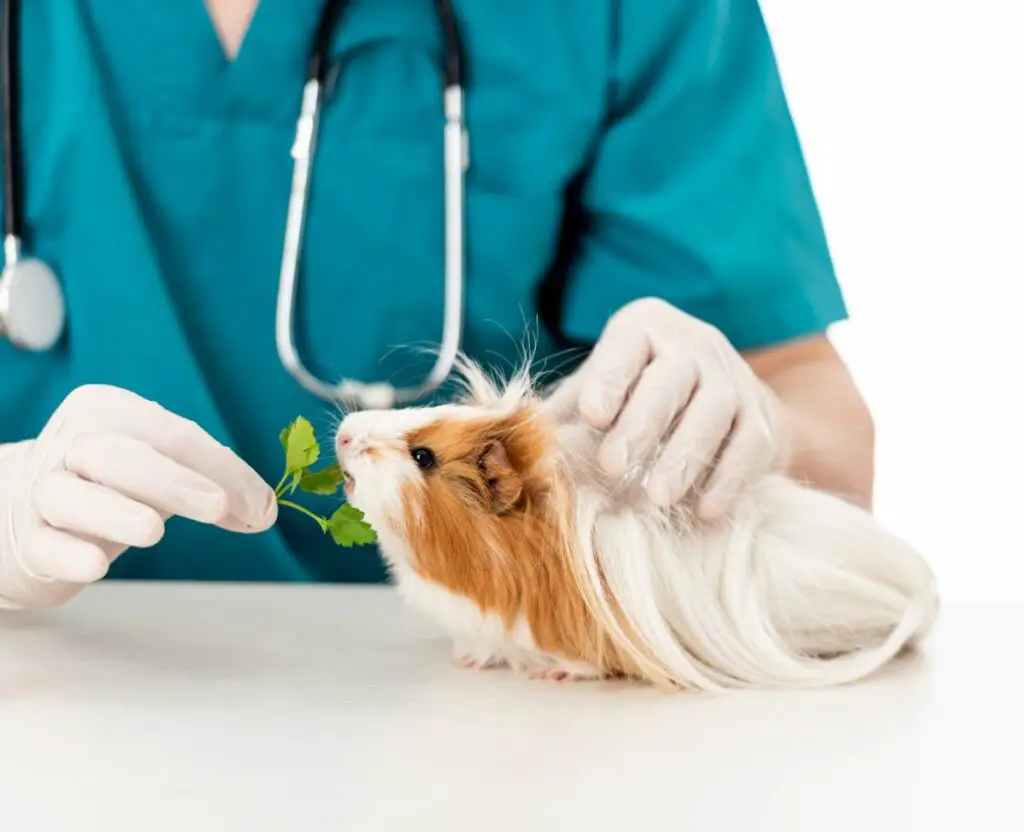Guinea pigs are adorable, friendly, and fun pets that are easy to take care of. They are herbivores, which means their diet should consist mainly of fresh hay, vegetables, and fruits.
However, it is important to remember that not all foods are safe for guinea pigs to eat. In fact, some foods can be extremely harmful and even fatal to them. In this comprehensive guide, we will explore what foods guinea pigs cannot eat and why it is important to monitor their diet.

Understanding Guinea Pig Diet: What Do They Need to Stay Healthy?
Guinea pigs need a balanced and nutritious diet to stay healthy. Their diet should consist of hay, fresh vegetables, and fruits. They also need fresh water and vitamin C supplements since their bodies cannot produce it naturally. Feeding your guinea pig a diet that is high in vitamin C is essential to their health since a deficiency in this vitamin can lead to scurvy.
What Foods Should Be Included in a Guinea Pig’s Daily Diet?
Fresh hay should be the foundation of your guinea pig’s diet. This will provide them with the fiber they need to keep their digestive system healthy.
Vegetables like romaine lettuce, carrots, bell peppers, and cucumbers can also be included in their daily diet. Fruits like apples, pears, strawberries, and blueberries can be given as a treat.
Why Is It Important to Monitor What Your Guinea Pig Eats?
It is important to monitor what your guinea pig eats because not all foods are safe for them. Some foods can cause serious health problems, and others can be fatal. Monitoring their diet will ensure they stay healthy and happy.
List of Foods That Guinea Pigs Can’t Eat
Processed foods
Processed foods, such as chips, crackers, and cookies, should never be given to guinea pigs. These foods are high in sodium, sugar, and fat, which can lead to obesity, heart disease, and other health problems.
Certain vegetables
While vegetables are an essential part of a guinea pig’s diet, some vegetables can be dangerous for them.
Vegetables like spinach, kale, and rhubarb contain high levels of oxalic acid, which can cause kidney stones and other health problems.
Other vegetables like onion and garlic should also be avoided because they can be lethal for cavies.
Certain fruits
Fruits should only be given to guinea pigs as a treat since they are high in sugar. Fruits like grapes and raisins can also be dangerous for guinea pigs since they can cause kidney failure.
Nuts and seeds
Nuts and seeds should never be given to guinea pigs since they are high in fat and can cause digestive problems. They can also be a choking hazard.
Meat
Guinea pigs are herbivores which means that they can only eat plant based foods. As a result, you should never feed your guinea pig any kind of meat. Chicken, fish, beef, and all other kinds of meat are not digestible for them.
In addition, other non-plant foods like eggs should also be avoided.
Chocolate or candy
Guinea pigs cannot properly digest candy or chocolate, so you should never feed it to them.
The Dangers of Feeding the Wrong Foods to Guinea Pigs
How Eating the Wrong Foods Can Impact Your Guinea Pig’s Health
Eating the wrong foods can have serious health consequences for guinea pigs and can even be lethal. Foods that are high in sugar, salt, and fat can lead to obesity, heart disease, and other health problems.
Foods that are high in oxalic acid can cause kidney stones and other urinary problems. Additionally, foods that are toxic can cause serious illness or even death.
What Are the Signs That Your Guinea Pig Has Eaten Something They Shouldn’t Have?
If your guinea pig has eaten something they shouldn’t have, they may show signs of digestive problems like diarrhea, bloating, or constipation.
They may also have trouble breathing, seizures, or other neurological problems. If you suspect that your guinea pig has eaten something they shouldn’t have, it is important to contact your veterinarian immediately.
What to Do If Your Guinea Pig Has Eaten Something They Shouldn’t Have?
If your guinea pig has eaten something they shouldn’t have, it is important to contact your veterinarian immediately.
Depending on the severity of the problem, your veterinarian may recommend a change in diet, medication, or surgery. It is important to remember that prevention is the best way to keep your guinea pig healthy.
Conclusion
Guinea pigs are adorable and fun pets that require a balanced and nutritious diet to stay healthy. It is important to remember that not all foods are safe for them to eat. In this post we’ve gone over some of the foods to avoid, but keep in mind that this list is not exhaustive, there may be other foods out there that are unsafe for your furry friend.
Feeding your guinea pig a diet that is high in fresh hay, vegetables, and fruits, and low in processed foods, nuts, and seeds is essential to their health.
Monitoring their diet and watching for signs of illness is also important. By following these guidelines, you can ensure that your guinea pig stays happy and healthy for years to come.
- How Long Do American Eskimo Dogs Live? Important Factors and Care Tips - September 29, 2023
- Do American Bulldogs Need Grooming? Essential Tips and Care Guidelines - September 29, 2023
- Do Bengal Cats Enjoy Playing? Essential Tips for Keeping Them Active - September 29, 2023